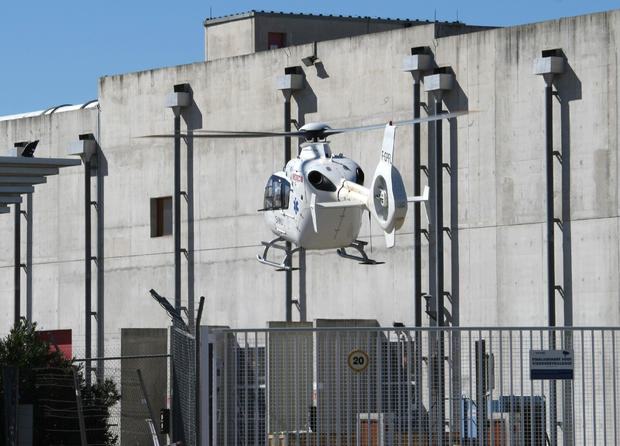Explosion rocks French nuclear site
Last Updated 10:45 a.m. ET
PARIS - An explosion at a nuclear waste site in southern France Monday killed one person, seriously burned another and slightly injured three others, France's nuclear safety body said.
The Nuclear Safety Authority said no radioactive leaks have been detected in the blast at 12:37 p.m. local time, at an oven in the Centraco nuclear site. The accident was under control within the hour, the agency said in a statement.
Centraco is located on the grounds of another nuclear site, Marcoule, in the Languedoc-Roussillon region near the Mediterranean Sea.
"According to initial information, the explosion happened in an oven used to melt radioactive metallic waste of little and very little radioactivity," the statement said. "There have been no leaks outside of the site."
Those injured were not contaminated with radiation, and the outside of the building that houses the oven showed no sign of damage or contamination either, the agency said in a separate statement.
Local media reports that firefighters have thrown a security cordon around the Centraco plant, which contains an incinerator that burns low-level contaminated waste. The plant is run by Socodei, a subsidiary of the French power company EDF.
Officials from EDF stressed that there was no nuclear reactor on the site and that no waste treated at the site of the explosion came from a reactor. EDF spokeswoman Carole Trivi said a fire broke out after the explosion, but it has since been brought under control.
The cause of the blast was not immediately known, and an investigation has been opened, Trivi said.
A separate statement from France's Nuclear and Alternative Energy Commissions added that the site of the explosion remains sealed and its ventilators were operating.
The Marcoule facility, located in Langedoc Roussillon, in southern France near the Mediterranean Sea, opened in the late 1950s but was decommissioned as a power generator in the 1990s. CBS News' Elaine Cobbe reports there are total of four reactors on site, three of which had been deactivated.
Trivi said the Centraco plant treats mostly waste from EDF's own power plants, as well as a small amount of material from hospitals or medical research labs.
Nothing comes from weapons manufacture, she said.
According to AREVA, one of the French Atomic Energy Commission's industrial partners at the site, the facility has been reconfigured since 1997 to process decommissioned nuclear materials and waste, and for temporary storage.
MOX (mixed oxide) fuel - a nuclear fuel generated from uranium and plutonium recycled from nuclear warheads - is also produced here.
Other facilities at the site produce tritium (a radioactive isotope of hydrogen with both business and military applications), decontaminate tools and machines, and treat liquid waste and waste products.
The head of the Vienna-based International Atomic Energy Agency, Yukiya Amano, said his organization's "incident and emergency center was immediately activated and has sent requests for detailed information."
France is the world's most nuclear-dependent country in the world, with the lion's share of its electricity coming from the 58 nuclear reactors that dot the country. France is also a major exporter of nuclear power, treats nuclear waste from around the world, and state-owned nuclear giant Areva is one of the country's most prominent companies.
The kind of soul-searching about using nuclear power that swept the world following Japan's March 11 tsunami and the disaster at the Fukushima nuclear plant have been largely absent in France, which has stuck firmly to its pro-nuclear policy.
In June, President Nicolas Sarkozy pledged that France will stick to a plan to invest 1 billion euros ($1.37 billion) in future nuclear reactors.
By contrast, neighboring Germany took eight of its older reactors off the grid in the wake of the Japanese disaster and lawmakers have voted to shut the country's nine remaining nuclear plants by 2022.
Still, French environmentalists have long called for the end to the country's nuclear program, and the Europe Ecology-Greens party urged transparency in responding to Monday's accident.
